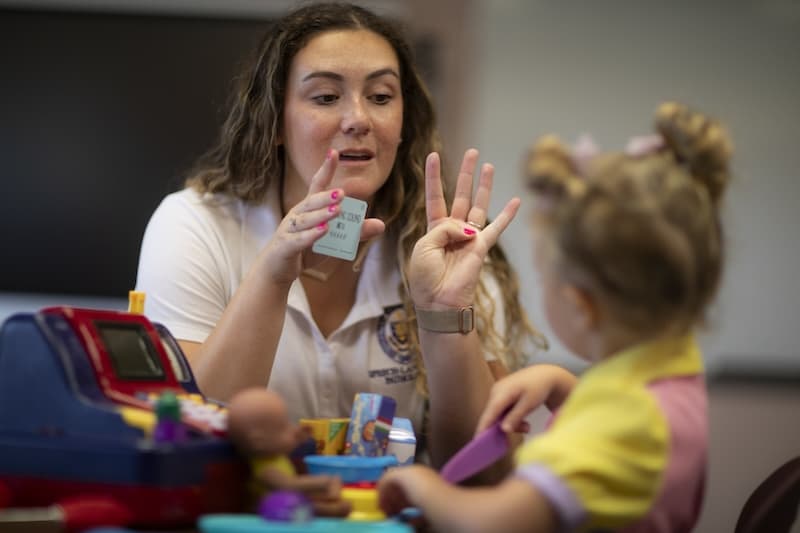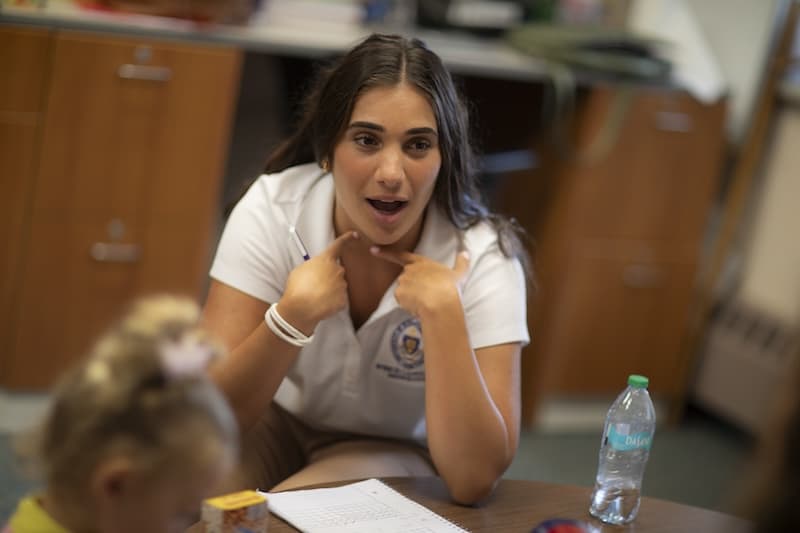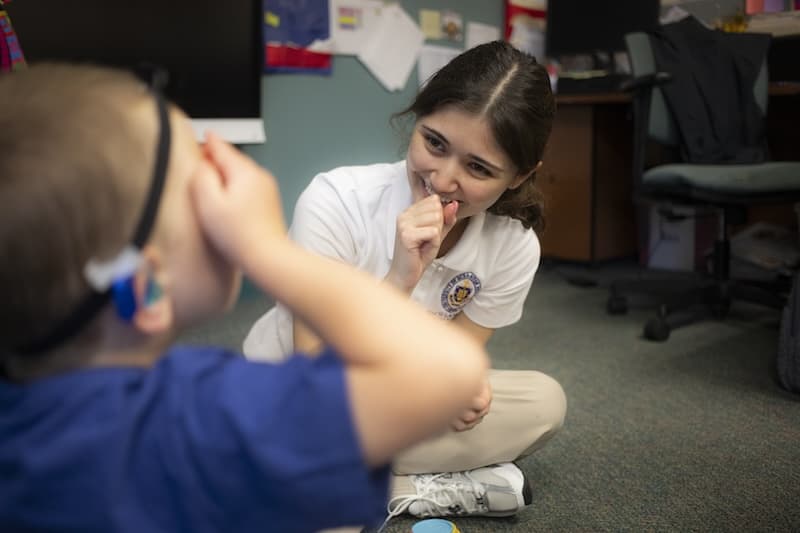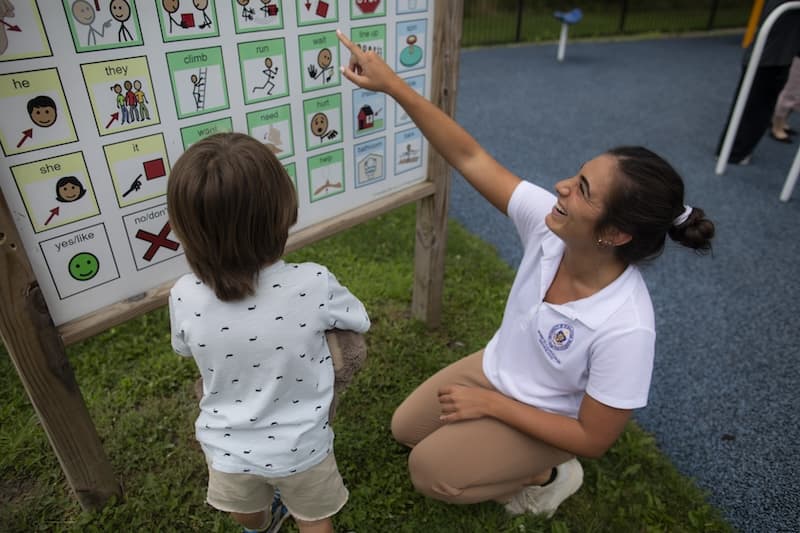Speech-Language Pathology Graduate Students Get Unique Learning Experience
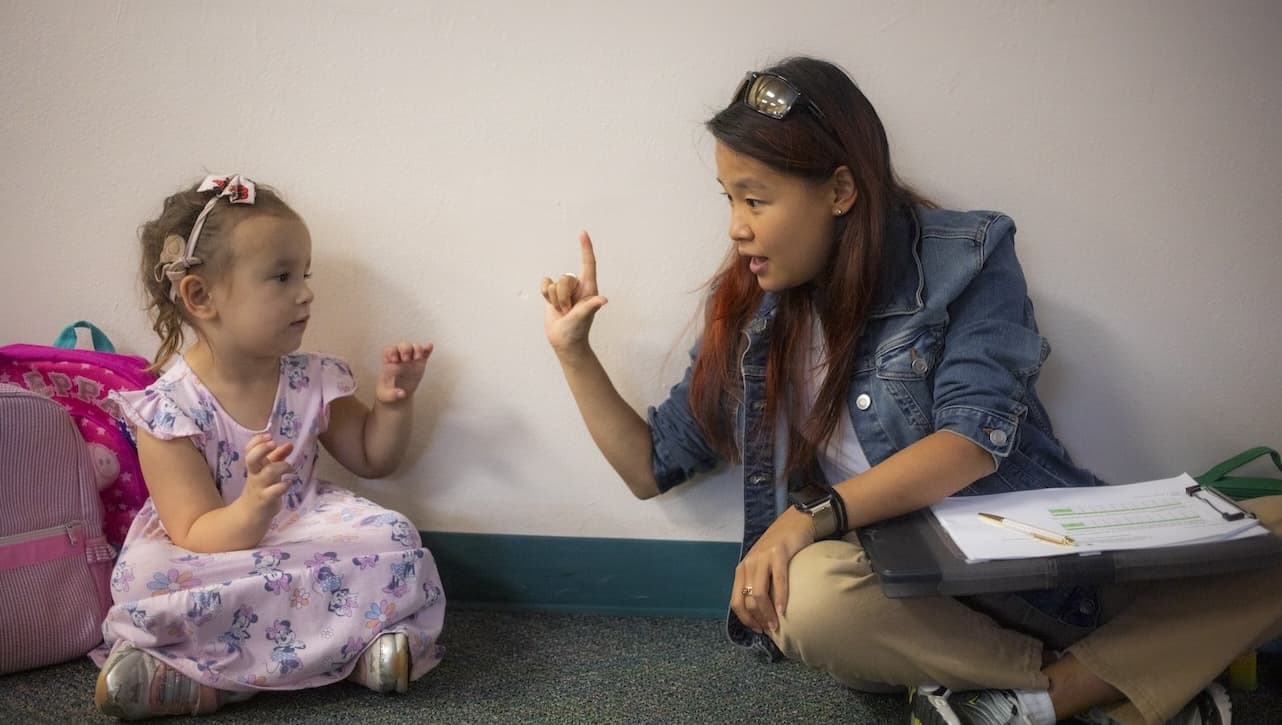
The first cohort of graduate students in The University of Scranton’sSpeech-Language Pathology Program master’s degree program learned more than they expected at their first eight-week clinical rotation at a Summer Academy for Speech and Language Enrichment at the Scranton School for Deaf and Hard of Hearing Children (SSDHHC).
Although the experience surprised the students, the unique learning opportunities offered through the summer academy were deliberately orchestrated by the program’s director Hope E. Baylow, D.A., assistant professor and director of the University’s Communication Sciences and Disorders Program, and Tara Carito, the University’s clinical education coordinator for the Speech-Language Pathology Program.
“The Summer Academy for Speech and Language Enrichment is an immersive program designed to provide hands-on experience and advanced training in working with children with communication disorders, including those who are deaf and hard of hearing. This academy offers a unique opportunity for SLP students to apply their theoretical knowledge in real-world settings under the guidance of experienced clinicians while making a meaningful impact on the lives of children with diverse communication needs.
"Through interactive sessions, collaborative projects, and direct clinical practice, participants gain valuable skills and insights that prepare them for their future roles as compassionate and effective speech-language pathologists,” said Dr. Baylow.
Dr. Baylow explained that the summer academy consisted of three sessions that ran daily from Monday through Thursday. At the academy, the graduate students were assigned a single child for each session. They worked with the same child throughout the day in individual speech and language enrichment sessions, as well as in group sessions in art and other modalities to allow the children at the academy to interact with each other.
“Individual speech therapy sessions focused on one-on-one interaction between the speech-language pathology graduate intern and the child, allowing for personalized attention and tailored interventions that directly addressed the specific needs and goals of the individual. These sessions provided a concentrated environment where progress was closely monitored and adjustments made in real-time, optimizing the therapy process,” said Dr. Baylow.
“In contrast, group speech therapy sessions involved multiple clients working together under the guidance of an SLP. These sessions fostered social interaction, peer support, and communication practice in a more dynamic setting. Group therapy allowed the children to develop their communication skills in a social context, providing opportunities to generalize skills learned in individual sessions while also benefiting from the diverse experiences and feedback of their peers,” said Dr. Baylow.
The academy also allowed the students to experience different modalities of communication: verbal, American Sign Language (ASL) and Augmented Alternative Communication Devices (AAC).
“One of the children I worked with had bilateral hearing loss, so it really sharpened my ASL skills,” said graduate student Ashton Armstrong, Okeechobee, Florida, who, along with the other students, learned ASL before starting the academy. “I was surprised by how quickly we learned signs from each other.”
The University’s 63-credit Speech-Language Pathology Graduate Program is offered in a blended learning environment that combines synchronous remote academic coursework with experiential learning. More than 75 percent of the program is conducted remotely. The first year of courses was offered in an online format, so the summer academy externship experience was also the first time the cohort was together in person.
“The collaboration is phenomenal. We are flourishing, learning from each other at a fast pace,” said Destiny Carpitella’ 22, Brooklyn, New York, who earned her bachelor’s degree in early and childhood education from Scranton.
The online format attracted Armstrong to the program. A graduate of the University of Central Florida, Armstrong didn’t want to have to move to a college campus for a master’s degree program. The online format allowed her to stay where she resided in Florida.
Carpitella liked the flexibility the online format provided, allowing her to study at her own pace.
Both said the summer clinical experience was a bonus to the program. In addition to allowing the students to bond, it allowed them to “get to know our professors better,” said Armstrong.
Carito, the University’s clinical education coordinator, said she has seen the graduate students develop skills and confidence during the academy as she watched the students interact with the children with competence and grace.
Carpitella summed up the clinical rotation in just three words, calling it a “positive learning experience.”
The Master of Science (M.S.) Education Program in speech-language pathology (distance education) at The University of Scranton is a candidate for accreditation by the Council on Academic Accreditation in Audiology and Speech-Language Pathology (CAA) of the American Speech-Language-Hearing Association, 2200 Research Boulevard, #310, Rockville, MD 20850, 800-498-2071 or 301-296-5700. Candidacy is a “preaccreditation” status with the CAA, awarded to developing or emerging programs for a maximum period of 5 years.
For more information about the Speech-Language Pathology Graduate Program at The University of Scranton, contact Dr. Baylow at hope.baylow@scranton.edu, or visit the program’s webpage.


